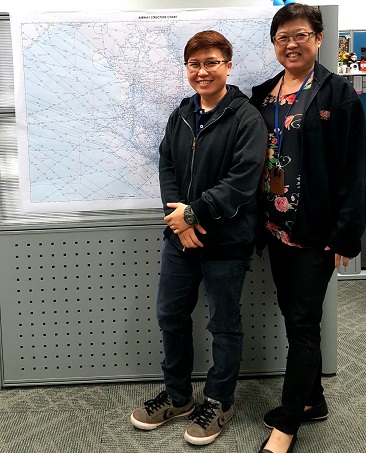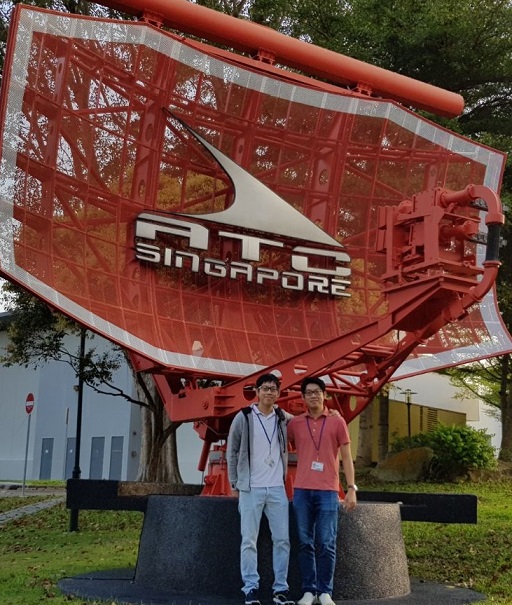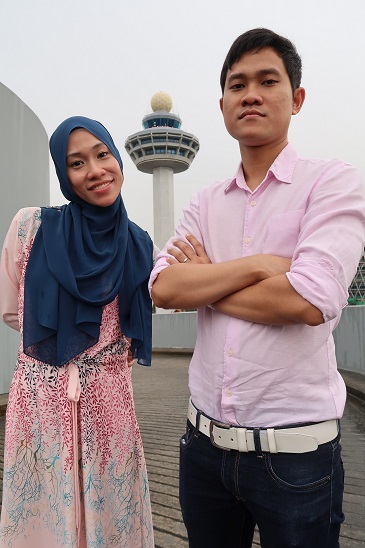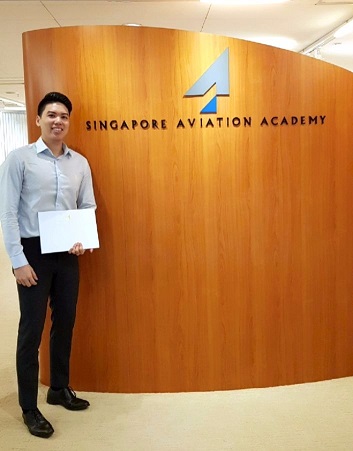As their stories illuminate the philosophy behind Singapore’s investments in “man”, “machine” and “method”, you will also discover the passion, camaraderie and determination that have put Singapore in good stead to bring air traffic management to the next level – for the nation, the region and beyond.
Invisible Hands At Work
They are dextrous professionals, expected to think fast and make decisions with split-second precision. When they do their jobs well, nothing happens. Working in an environment of constant pressure, they handle intense stress with grace and composure. Yet, they are mostly invisible to the millions of passengers whose planes they guide to land and take-off safely and on time at Changi Airport.
In this second feature in our Beyond Our Blue Skies series, we look at Singapore’s air traffic management (ATM) “man-power”. We get up close with a special group of people. Not only do they serve in the family of CAAS as air traffic control officers (ATCOs) and support officers (ATCSOs), they are family in real-life: (i) twin brothers and ATCOs Ng Zhen Hui and Ng Zhen Zhou, (ii) brother and sister ATCOs Mohd Shazrin Baderulshah and Syafiqah Baderulshah, (iii) mother and ATCSO Carol Lim and daughter, ATCO Yvonne Goh, and (iv) husband and wife ATCSOs, Ching Chew Seng and Goh Siang Ying (Mrs Ching), with their son Milton Ching ATCO in training. We also spoke with ATCO trainers Kathirvelu Krishnan (Velu) from the Singapore Aviation Academy and Jeyapala Machap (Bala) from ATC Training and Development.
The Front Row Culture
It’s a bigger group than usual for an interview session. But, we wanted to feel the dynamics. And it was obviously there from the start, what author-entrepreneur Seth Godin calls the “front row culture”. There is excitement and enthusiasm as everyone huddles together in campfire formation to begin our session. You can tell this is a group of individuals genuinely passionate about what they do and eager to explore the future.
“The culture, the choice of front row or back row, is a choice. It's the result of investment and effort.” – Seth Godin
An Extra SPICE
Safety. People. Integrity. Customer Service. And Excellence. Or SPICE. This is the acronym that the people of CAAS live by, the core of the corporate culture. But the connective tissue of CAAS is also underscored by a strong culture of caring.
When ATCSO veteran Carol knew that her daughter Yvonne was unhappy with her marketing job and wanted to apply for ATCO in CAAS, she was supportive. “I have worked at CAAS as an Operations Assistant since 1973 and have stayed this long because it’s a great company to work for, otherwise I would have discouraged her,” Carol said. Yvonne now serves as an ATCO in the Area stream.
Carol appreciated the flexible hours of shift work that allowed her to raise her children and is also thankful for the job security at CAAS. “During economic downturns like the SARS period, many other companies were retrenching workers, but CAAS worked hard to re-scope our jobs and keep all its staff. Then, in times when staffing was low, we all worked harder together, and that created stronger bonds among our colleagues.”

Daughter & ATCO Yvonne Goh, with Mother, ATCSO Carol Lim
Learning and Growing
Caring about your people also means helping them to learn and nurture their full potential. “We have a learning culture, where if you make an error, they try not to pinpoint fault but focus instead on what we can learn from there and how we can avoid a repeat,” Yvonne explains.
“Over the years we have constantly improved the training process to make it more robust and effective,” Bala said, “Trainees are carefully monitored and provided with extra training if necessary to earn their rating licences.”
Drawing on 25 years of experience in air traffic control (ATC), Bala is able to impart his skills and knowledge to new ATCOs under his charge as a Senior On-Job-Training Instructor (OJTI) in the Training and Development section. “I am also able to help the ATCOs understand the challenges faced by the pilots when controllers give them instructions to carry out certain manoeuvres because I hold a Private Pilot Licence (PPL),” he added.
.jpg?sfvrsn=2)
ATCO Trainer, Jeyapala Machap (Bala)
Fellow trainer Velu shared with us that CAAS keeps pace with the latest technology to match the skills of a digitally-connected workforce. Computer Based Training (CBT) and LORADS III1 training simulators were introduced to engage and support trainees in a more creative manner. “However, there is always a need for ATCOs to be able to manage the skies in the event of an extraordinary electronic systems incident or outage. Thus, some skills will always remain essential,” he said.
.jpg?sfvrsn=2)
ATCO Trainer, Kathirvelu Krishnan (Velu)
Three years into the job, after they were promoted to Grade 2 ATCOs, twin brothers Zhen Hui and Zhen Zhou were given the opportunity to see the bigger picture of regional air traffic management with a three-month attachment to CAAS HQ. They were first posted to the management side of operations, and then to Training & Development for another three months.
Zhen Zhou elaborates, “We have individual career training and development roadmaps drawn out for us. Apart from increasing our ATCO operational skills and knowledge, management makes the effort to grow our other areas of potential. For example, we are sent for courses to build our knowledge to take on higher roles in the future.”

Twin Brothers, ATCOs Ng Zhen Hui & Ng Zhen Zhou
Bala explained, “Depending on their inclinations and aspirations, we are here to support and enable our ATCOs to develop their roles in the field of air traffic management. An ATCO who is very inclined to technical knowledge for instance, can assume the role of system design for ATM. For ATCOs with strong operational inclinations, they could perform their duties in planning ATC operations with both internal and external units. There are also other roles that an ATCO could assume within other Divisions in CAAS, such as the Air Navigation Services Policy and Planning (ANSPP), Safety Policy and Licensing (SPL) or Aerodrome and Air Navigation Services Regulation (AAR) Divisions. Having an ATC background would be an added advantage in all these appointments.”
Trust and Teamwork
One might presume that in such a high-risk, high-stress atmosphere, the workplace would be filled with conflict and anxiety. That’s not what we found.
“Being an ATCO is sometimes overwhelming, but that’s when your friends and colleagues will pitch in. We work as a team, even supervisors help to watch traffic!” Yvonne explains. “Sometimes there are more complex situations, especially with military air traffic. That’s when the more experienced staff can help you make better choices,” she adds.
Zhen Hui, now a seasoned Grade 3 ATCO in the Area stream, shares, “A few years ago there was an air show. It caused long closure periods resulting in lots of aircraft holding and circling, unable to land. I was on my break getting ready to take over the shift from my more experienced colleague, and feeling a little daunted as I had never handled such high traffic. When I went to plug in, my colleague said ‘Zhen Hui, never mind, I have the full picture, you just sit beside me’. So instead of going off-shift, he did the whole session with me just sitting beside him for moral support. Together, we did it!”
Looking over to Ching recalling another personal example of the dynamic teamwork, Carol shares, “Remember you were in the hospital one time when we were working in the same cluster. Some of us were unfamiliar with the work, but Ching is very experienced. From his hospital bed, he called us to give directions and guidance!”
Ching recalls the aftermath of the Changi T2 fire on 16 May 2017. The fire resulted in all flights from T2 needing to be handled by the other two terminals, and the situation called for ATC to have reduced arrivals at Changi Airport.
“My team was on duty that night and I could see that the ATC managers were very busy trying to find out which aircraft would be coming in. Based on my experience, I retrieved the arrival list from Changi Airport Group (CAG) and gave it to the watch manager. He was very grateful because now he was able to better plan the arrivals.”
“Then, ATC asked our team to coordinate with other adjacent Area Control Centres (ACC) to hold their departures on the ground until clearance was given. The strong collaboration between the ATCOs and the ATCSOs worked out well for the situation.”
.jpg?sfvrsn=2)
Husband & Wife ATCSOs, Ching Chew Seng and Goh Siang Ying (Mrs Ching)
A couple of days later, the ATC manager wrote a letter of commendation to express his appreciation for Ching and the ATCSO team support, resulting in Ching’s team receiving the SPICE award.
A Higher Purpose
“Of course we all wish for days when nothing bad happens, but the most satisfying part of the job is when we are still able to perform professionally and efficiently to keep everyone safe,” shares Syafiqah.

Sister & Brother ATCOs, Syafiqah Baderulshah & Mohd Shazrin Baderulshah
For Zhen Zhou, a Grade 3 ATCO in Area stream, knowing he has done his job to the best of his ability gives him satisfaction. “At the end of the day, it’s good to know I’ve done my best in resolving any conflict or minimising delays for hundreds of thousands of passengers.”
Yvonne expressed her passion for solving problems: “When there’s an issue at work to be solved, it’s great to work with your friends and colleagues to come up with a solution together. That feels really good. It’s something hard to quantify.”
ATCO trainee Milton has gone from having an interest in air traffic management, to developing a passion for his job. “I had a friend who went to work at the bank and he told me the stress he feels is empty because he’s chasing figures, but if I feel any stress, it’s an act of public service. Being in this line, we are all providing a public service. Any reward and contentment we feel come from when real lives are affected and people are touched, whether or not they know our hand was involved.”

Mr & Mrs Ching's Son, ATCO in training, Milton Ching
Shazrin remembers the good times from their childhood days, enjoying the experience of travel with their parents. Now he and his sisters just want to “give back” and help to maintain the high quality of aviation in Singapore that the world recognises. “For Singapore to be a leading ANSP, yes, technology plays a part, but I believe it’s more because of the strong Singaporean work ethic; we are determined to perform to the best of our ability,” Shazrin said, “With the implementation of technology in ATC, the younger generation are at an advantage as they grew up together with computers and automation, allowing them to be trained faster.”
Mrs Ching said: “When I train the new staff and when I see them progress in their careers, I feel successful too.” Mr Ching echoed his wife’s sentiments: “My present role as a supervisor and trainer allows me to play a small part in the career development of my younger colleagues. When I come in to deliver lectures, I always think back how I was sitting back there 35 years ago. We need to train people so they can replace us when we retire.”
Unified by bonds of friendship and embracing a culture that fosters putting others before self, all the men and women of CAAS expressed pride in their work. So it’s unsurprising then, that they share a higher sense of purpose at work. Perhaps that’s the right stuff that moves family members to pursue (and encourage each other to pursue) the same careers in the same company.
============
In our next story, join us for illuminating discussions with three of CAAS’s technical experts who will reveal what drives the constant planning, development and implementation of cutting-edge technology at CAAS.
1 Long Range Radar and Display System (LORADS) III is the world’s most advanced air traffic control system. LORADS III is a generational shift in ATM technology, incorporating the latest technologies and innovative features that enable significantly higher levels of automation and sophistication in air traffic control.